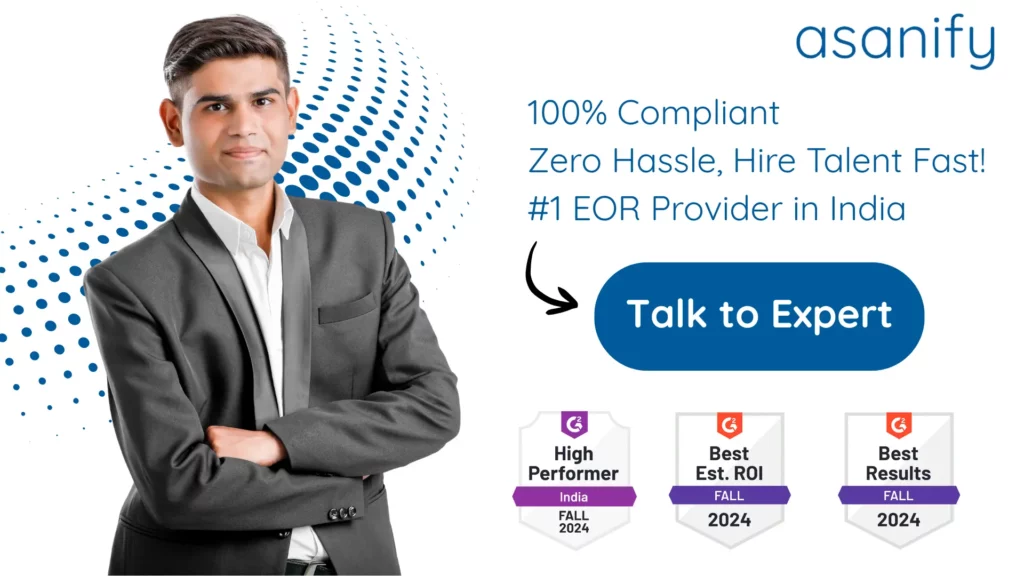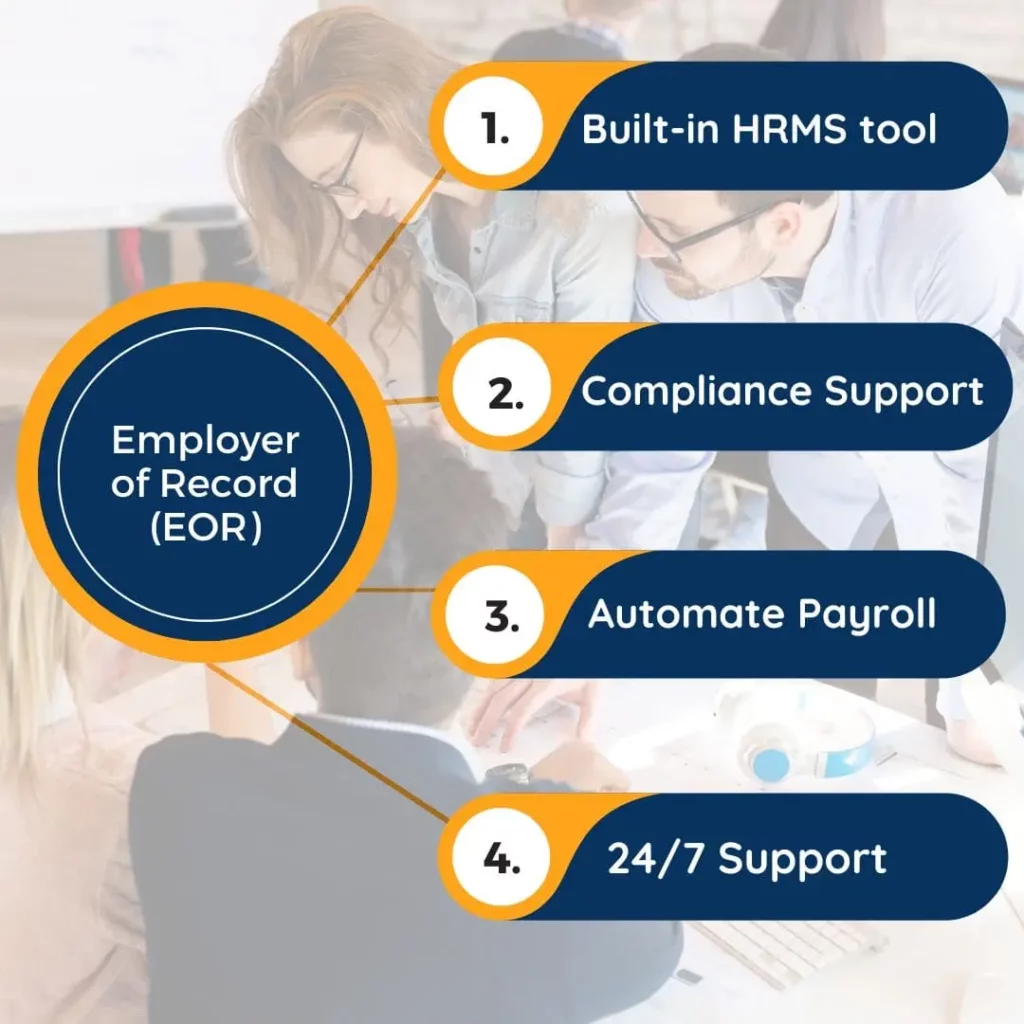Learn how an Employer of Record (EOR) differs from a staffing agency in cost, compliance, and control—then, make the right choice for your global hiring strategy.
Table of Content
- What is an Employer of Record (EOR)
- What is a Staffing Agency?
- EOR vs Staffing Agency: Key Differences Explained
- When Should You Use and Employer of Record
- When Should You Use a Staffing Agency
- Why Many Companies Are Switching to EORs in 2025
- Legal & Compliance Considerations
- Real Cost Comparison: EOR vs Staffing Agency
- How Asanify Helps You Hire Through an EOR Model
- FAQs
- Conclusion
Employer of Record vs Staffing Agency: Key Differences Explained – 2025 Guide for Global Employers
What Is an Employer of Record (EOR)?
An EOR provides the legal employment of workers on behalf of other businesses. In essence, the EOR is the legal employer by law, although on a day-to-day basis and in terms of function and operational ease, the employee mostly works for and reports to your company.
The EOR is responsible for payroll, tax deduction, employment contracts, and statutory benefits. This helps ensure local labor law compliance and also means that one would not be required to establish a local legal entity in that country.
EORs go great for companies seeking to hire remote employees full-time across borders. Constantly blossoming SaaS companies, remote-first startups, and companies interested in entering foreign markets rely on EORs for simplifying international hiring and legal risk.
What Is a Staffing Agency?
Staffing agencies, also called staffing firms or temp agencies, recruit and place talent in temporary, contract, and short-term assignments. These agencies generally maintain a pool of candidates from which they match those candidates to the client company based on the specifications required.
Generally speaking, the staffing agency is also the employer, granting payroll administration along with the basic onboarding. On the other hand, unlike an EOR, their compliance support is often limited to the local jurisdiction and cannot go beyond it on a global scale.
Staffing agencies are best suited for those quick backfills, seasonal hires, and on-site roles that need rapid-flexing workforce solutions. Think of them as the “go-to” partner for anyone who needs someone there right now, but maybe not for the long haul.

EOR vs Staffing Agency: Key Differences Explained
While both models help businesses outsource aspects of employment, they serve very different purposes. Here’s a quick comparison to illustrate their core differences:
| Feature | Employer of Record (EOR) | Staffing Agency |
| Who Hires the Employee | EOR | Staffing agency |
| Who Sources the Talent | Client company | Staffing agency |
| Compliance Handled By | EOR (end-to-end) | Partially, often limited to local contracts |
| Best For | Remote, full-time, global employees | Temp roles, quick local hiring |
| Commitment Level | Medium to long-term | Short-term, flexible |
| Global Hiring Support | Yes | Rare |
The biggest distinction lies in the level of control and compliance. EORs provide a legal framework to onboard global employees seamlessly, while staffing agencies focus on speed and convenience for short-term or localized needs.
Suggested Read: Top Employer of Record (EOR) Service Providers in UAE (2025)
When Should You Use an Employer of Record?
An EOR is particularly useful when your business is seeking to grow globally without the compliance headache of establishing a foreign entity. It’s an intelligent solution when you need to:
- Gain access to new markets promptly and compliantly
- Employ remote full-time workers overseas
- Establish a geographically distributed team with local labor law compliance
- Minimize contractor misclassification risk
By aligning with an EOR, you are able to efficiently expand internationally without diverting your attention from growth and operations, handing the administrative and legal heavy lifting over to the professionals.
When Should You Use a Staffing Agency?
Staffing agencies act as a quick solution with flexibility for employment cases where the time period is short or location is specified. In other words, put staffing agencies between companies and jobs when jobs almost immediately fill for seasonal peak demand, maternity cover, or project needs.
They are especially used when urgent replacement of employees is needed, preferably without any long-term contracts. Therefore, employers usually engage staffing agencies to quickly build call centers, support, or customer service teams for high-demand periods.
For organizations cautiously watching their purse strings and having erratic workload, the other benefit staffing agencies provide is another way to outsource while not increasing permanent head count. Nevertheless, this strategy is suitable for assignments that do not require a thorough knowledge of the company’s long-term plan or culture.

Why Many Companies Are Switching to EORs in 2025
The job market is shifting rapidly in 2025, and EORs are driving the shift. With remote-first work becoming the new norm, businesses are redefining traditional hiring practices to accommodate an international and distributed workforce.
One of the key reasons behind this transition is the increased complexity of international labor laws. Misclassifying employees or neglecting local laws can lead to penalties, legal actions, or even the loss of valuable talent. EORs provide a compliant and efficient solution, particularly for companies recruiting across borders.
Besides, high-quality talent now increasingly prefers the stability and security of compliant full-time employment, something EORs facilitate without creating a legal entity. This is why most scaling companies and mid-sized enterprises are opting for EORs to retain global employees while being legally covered.
Legal and Compliance Considerations
Key Areas
Legal and compliance risks cannot be overlooked while hiring internationally. The following are a few of the key areas where companies must remain cautious:
- Preventing misclassification of workers, particularly between contractors and regular employees
- Handling local taxes, statutory benefits, and IP protection
- Preparing country-specific employment contracts and offer letters
- Learning about local leave rules, rights of termination, and dispute resolution channels
With Asanify, your international workforce is completely compliant—handling payroll, contracts, and local labor regulations without the requirement for an entity. Partnering with a global EOR platform like Asanify means companies can put an end to compliance anxiety and concentrate on scaling operations with certainty.

Real Cost Comparison: EOR vs Staffing Agency
Understanding the cost structure is essential when deciding between an EOR and a staffing agency. While both models have similar base costs per employee, the hidden legal risks and long-term ROI vary greatly.
| Hiring Model | Avg Monthly Cost per Employee (USD) | Hidden Legal Risks | Time to Hire |
| Employer of Record | $1,500–$3,000 | Low | 48 hours |
| Staffing Agency | $1,200–$2,800 | Medium–High | 2–7 days |
While staffing agencies might appear slightly more cost-effective upfront, EORs reduce long-term legal exposure and streamline onboarding, especially when hiring full-time global employees. This makes EORs a strategic investment for companies planning sustained growth in international markets.
Suggested Read: What is an Employer Of Record? A Complete Guide
How Asanify Helps You Hire Through an EOR Model
Recruiting global talent doesn’t have to be a complicated legal arrangement or a lengthy exercise in paperwork. With Asanify, companies can hire global workers with ease, without having to register an on-the-ground entity in the employee’s home country.
With 48-hour compliant onboarding in India and 150+ countries, Asanify manages everything from statutory perks and tax withholdings to local regulation-compliant employment contracts. The platform facilitates seamless payroll processing, minimizes administrative overhead, and assists you in retaining your team through defined benefits and compliance.
Above all, Asanify saves you from contractor misclassification and regulatory penalties by hiring talent under legally compliant, full-time agreements. Whether you’re growing across Asia, Europe, or the Americas, Asanify puts legal recruitment expertise at your fingertips.
FAQs: Employer of Record vs Staffing Agency
An EOR legally employs the worker on your behalf and ensures compliance in their country. A staffing agency typically sources and places talent in short-term or temp roles, often without global compliance infrastructure.
Yes, that’s their core strength. EORs allow you to hire full-time global talent without opening legal entities. Asanify, for instance, provides compliant hiring in over 150 countries.
In some cases, staffing agencies may have a lower upfront cost. However, the long-term legal risks and lack of compliance support can make them more expensive over time.
Top-tier EOR platforms like Asanify can complete end-to-end onboarding in as little as 48 hours, depending on the country and documentation.
Typically, no. They focus on short-term staffing and may not handle taxes, benefits, or labor laws across jurisdictions the way EORs do.
Yes, Asanify is a trusted Employer of Record in India and 150+ countries, making it a reliable partner for globally-minded startups and enterprises.
Absolutely. Platforms like Asanify specialize in converting independent contractors into compliant, full-time employees to reduce misclassification risks.
Conclusion
The decision to select an Employer of Record or a staffing agency is determined by your hiring objectives. If your priority is global business expansion, long-term employee retention, and compliance with the law, having a partnership with an EOR such as Asanify is the intelligent move. However, if you simply need to hire for short-term, local positions in a hurry, a staffing agency would be a better option.
Not to be considered as tax, legal, financial or HR advice. Regulations change over time so please consult a lawyer, accountant or Labour Law expert for specific guidance.




